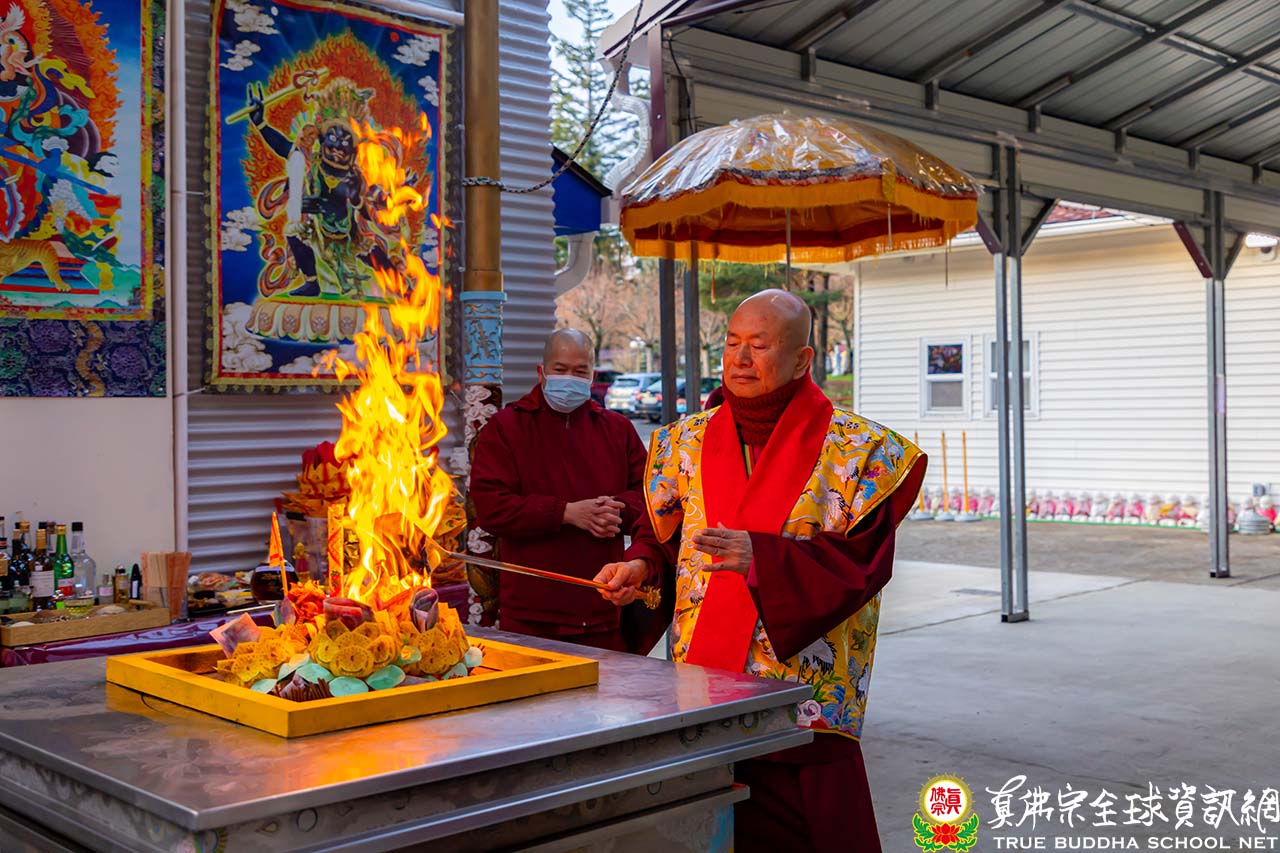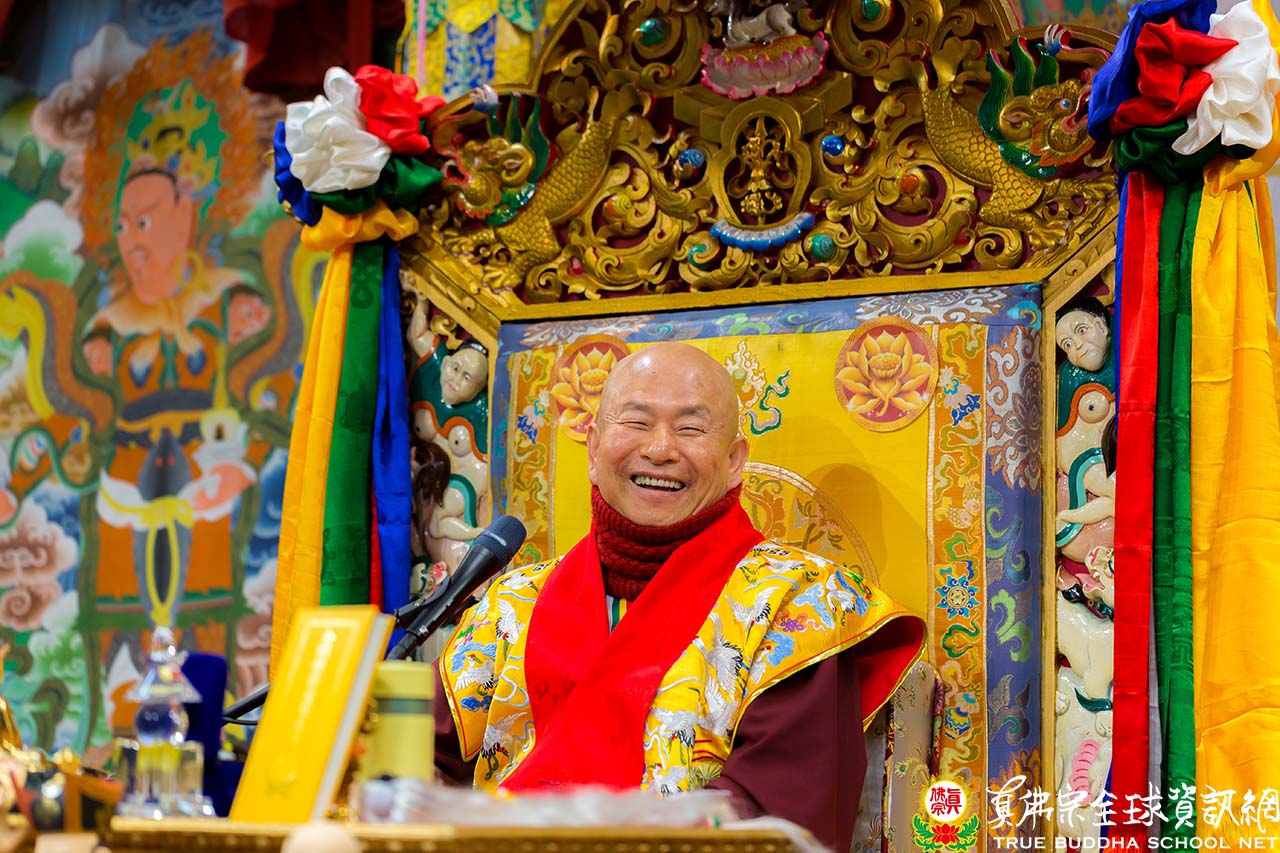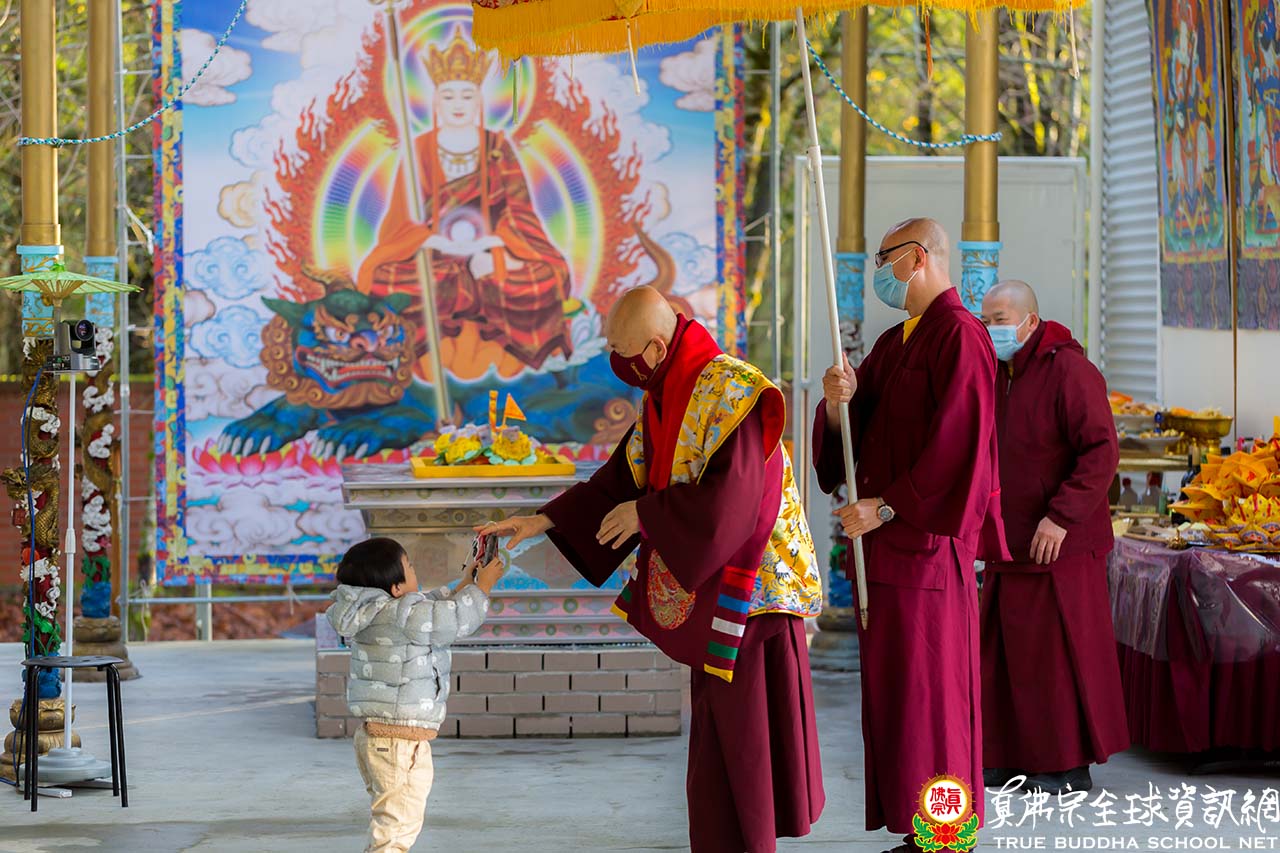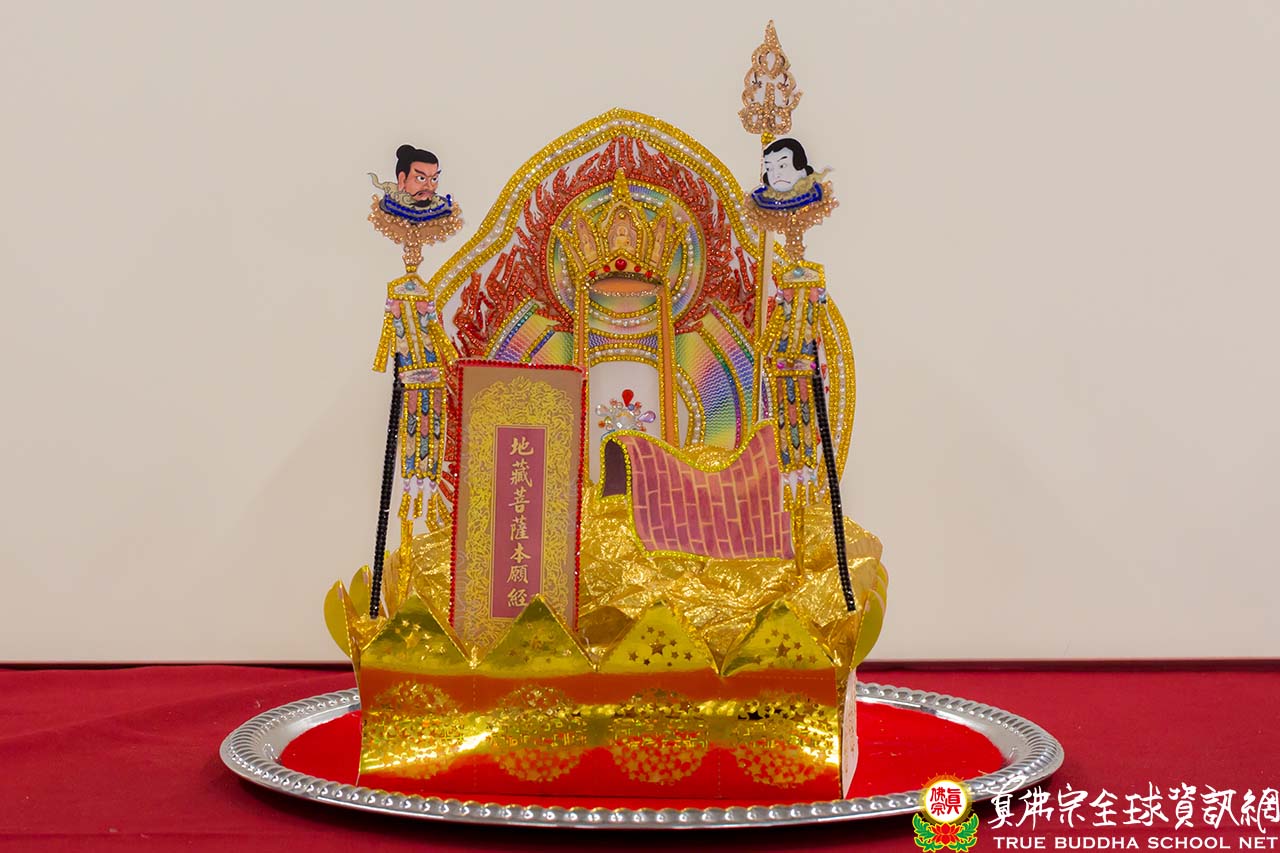
Vajracchedika Prajnaparamita Sutra
Vajra Sutra (Diamond Sutra)
Detailed Exposition by Living Buddha Lian-Sheng, Grandmaster Sheng-Yen Lu
Translated into English by True Buddha School Vajra Sutra Translation Team
Discourse 39, 5 December 2021 - Chapter Fourteen—Extinction Upon Abandoning Phenomena (continued)
Fourteen—Extinction Upon Abandoning Phenomena
Subhuti understood its profundity upon hearing this sutra and was moved to tears. He said to the Buddha, “World-honored One, it is rare indeed for the Buddha to speak on such a profound sutra. I have never heard of such a sutra ever since I attained my wisdom eyes.
“World-honored One, if someone generates pure faith upon hearing this sutra, they will give rise to real phenomena. This person will obtain the rarest of merits.
“World-honored One, the real phenomena are non-phenomena. Therefore, the Tathagata named it real phenomena.
“World-honored One, it is easy for me to believe, comprehend, accept, and uphold this sutra immediately upon hearing it. However, in the ensuing five hundred years, it would be most rare for sentient beings to hear, believe, understand, accept, and uphold the sutra. Why? Because [it is extremely rare for] a person not to have any view of self, others, sentient beings, and lifespan. The phenomena of self is non-phenomena, and so are the phenomena of others, the phenomena of sentient beings, and the phenomena of lifespan; they are all non-phenomena. Why? [Only] those who abandon all phenomena are called buddhas.”
The Buddha told Subhuti, “Just so, just so, Subhuti! If there is a person who is not shocked, frightened nor fearful upon hearing this sutra, it is extremely rare indeed! Why? Subhuti, the Tathagata said that the first and foremost paramita is not the first and foremost paramita; it is [merely] named the first and foremost paramita.
Subhuti, the Tathagata said that endurance paramita is not endurance paramita; it is [merely] named endurance paramita. Why? Subhuti, in the past, when King Kalinga dismembered my body, I was [in the state of] non-phenomena of self, others, sentient beings, and lifespan. Why? Because if I had the notion of self, others, sentient beings, and lifespan during the dismembering of my limbs, I would have felt hatred.
“Subhuti! Also, think of the sages who have practiced endurance for the past five hundred lifetimes, wherein each lifetime, they have no phenomena of self, others, sentient beings, and lifespan.
“Therefore, Subhuti, a bodhisattva should abandon all phenomena, generate the mind of anuttara samyaksambodhi, and give rise to the mind which does not dwell on sight, sound, smell, taste, touch, or anything at all. Even if the mind dwells on something, it is regarded as non-dwelling.
“Therefore, the Buddha said that a bodhisattva should not dwell on form when he performs the acts of giving. Subhuti! A bodhisattva should perform the acts of giving to benefit all sentient beings. The Tathagata said, ‘All phenomena are non-phenomena. Also, all sentient beings are not sentient beings.’ Subhuti, the Tathagata speaks truthfully, realistically, accordingly, credibly, and absolutely.
“Subhuti, all the dharma [anything] obtained by the Tathagata are neither real nor false. Subhuti, if a bodhisattva dwells on anything while performing acts of giving, it is as if he is in the dark; he will not see anything. If a bodhisattva does not dwell on anything when performing acts of giving, he is not blinded and will be able to see all sorts of forms as if the sun is shining.
“Subhuti! In future lives, should there be good men and good women who can accept and uphold, read or recite this sutra, they will be known and seen by the Tathagata through his wisdom, and they will attain vast and boundless merits.”

Now let’s talk about the Vajra Sutra’s Chapter Fourteen—Extinction Upon Abandoning Phenomena.
Subhuti said to the Buddha, “World-honored One, it is rare indeed for the Buddha to speak on such a profound sutra. I have never heard of such a sutra ever since I attained my wisdom eyes. World-honored One, if someone has pure faith upon hearing this sutra, he will give rise to real phenomena. This person will obtain the rarest of merits.”
Let me emphasize where the key points are. Subhuti said to the Buddha, “World-honored One, it is rare indeed for the Buddha to speak on such a profound sutra. I have never heard of such a sutra ever since I attained my wisdom eyes. Let me stop here. Subhuti said that he had attained his wisdom eyes long ago, yet he had never heard of such a deep sutra before. Vajra Sutra is indeed a very deep, profound sutra. Why is it profound? Why did he say that the Vajra Sutra is very profound?
I once had a discussion on the Vajra Sutra with the Dalai Lama. The Dalai Lama asked me what “form is emptiness, and emptiness is form” means. How do you explain “form is emptiness, and emptiness is form? Form is no different from emptiness, and emptiness is no different from form?” How do you explain that? My answer was “dual execution,” meaning utilizing both form and emptiness; while the Dalai Lama’s answer was “natural.” All we discussed in our half hour meeting was on sutras and the buddhadharma. We mentioned nothing about politics nor anything else, since I am a religious figure, I only talked about buddhadharma.
Form is emptiness, and emptiness is form. Form is no different from emptiness, and emptiness is no different from form. How to explain, he asked? I said, “Dual execution of form and emptiness,” while the Dalai Lama said, “[It is] natural.” Dual execution connotes that form is emptiness and emptiness is form; that form is no different from emptiness and emptiness is no different from form. Both of them. Dual execution is the middle way, as spoken by the Buddha; it’s not apart from form, and it is not apart from emptiness [it embodies both form andemptiness]. Both are intermingled! This is called dual execution.
The Dalai Lama said, “[It is] natural.”Natural means that when you see form, it is form, and when you see emptiness, it is emptiness. That is what he meant. Well, natural and dual execution are not very different. As such, we can say that the two of us are on equal footing, although one of us was talking about the flag and the other one was talking about the drum.[1]
Subhuti said that [the Vajra Sutra] is a very deep, profound sutra. Why is that so? As I have said before, if you understand the Vajra Sutra and put it into practice, you can attain buddhahood. You can completely eradicate all your karma! All karma is annihilated in the Vajra Sutra. There is no longer a cause for birth because there is no more phenomena of self. Since there is no “self,” “who” would generate such karma? What karma is there? There is none—all karma is gone! There are no phenomena of self and no phenomena of others.
Let me ask you a simple question. On the moon, is there [anything] good or bad? Does the notion of good or bad exist on the moon? The correct answer is no because there is nothing on the moon. Since there’s nothing on the moon, how can there be anything good or bad? There are no living beings or humans on the moon, how can there be good and bad? There are no tigers, leopards, lions, or elephants, not even COVID-19! It cannot spread there because there is nothing to transmit to. There are no germs, even! What is good and bad? There are none. There is no good cause, bad cause, good causes and conditions, bad causes and conditions, no causes whatsoever; thus, this is why the sutra is very deep and profound.
Before this, you would never have thought about the idea of “no cause for birth and no cause for death.” Where does birth and death come from? They are the result of karma! Because you have karma, you have birth and death. If you have no karma, you won’t have birth and death. Without karma—good or bad—you will have no cause for birth and subsequently no cause for death. Without good or bad, how could birth and death manifest? Without birth and death, how could there be the rebirth cycle of the six realm of samsara? Hence, everything would be resolved. When the Buddha said that this is a very deep and profound sutra, this is what he meant! The key point is that karma is inconceivable. Essentially, when there is no karma, [only then] can one have attainment.
If you have good karma, you’ll ascend to the heavens. If you have bad karma, you’ll fall into the three lower realms. If you are neither good nor bad [half good and half bad], then you’ll become human. If you are a spiritual cultivator yet you are still jealous and envious, or like to fight, then you are an asura.[2] Everything is about cause and effect. Cause and effect is inconceivable, as how karma is inconceivable! This sutra talks about the profundity of karma.
Subhuti has attained the wisdom eyes. Very simply put, humans have only physical eyes, which can only see tangible things. This is called the physical eye. In addition to her physical eyes, Shimu has spirit eyes, so she can see the netherworld spirits, ghosts and gods. One night she saw Grandmaster and said, “Oh! You’ve changed form!” I asked, “What have I changed into?” She replied, “You’ve turned into a strange thing.” I asked her if my head grew some horns. She said, “No, but your face has five eyes!” Good heavens! We humans have only two eyes, but she saw me with five eyes! An eye in the middle, two eyes above, two eyes below. With five eyes, I have transformed into a strange creature! Why are there five eyes? Very simple—there are physical eyes, heavenly eyes, dharma eyes, wisdom eyes, and buddha eyes. These are the five eyes. So I told her, “You saw it very accurately.”
Sakyamuni Buddha summoned me to the Akanista Heaven to award me a prize. All buddhas and bodhisattvas present watched Sakyamuni Buddha awarding me the prize. I opened the red cloth-wrapped prize layer by layer. Inside it, there were five eyes. The five eyes then flew onto my face and transformed me into having five eyes. This happened just the day before yesterday, and today Shimualready saw the five eyes on my face. Wow! Shimu could see the five eyes on my face. She is truly amazing.
Subhuti had attained his wisdom eyes long ago, but he had never heard of a teaching like the Vajra Sutra. Never before! When Sakyamuni Buddha was expounding on the Vajra Sutra, many disciples were listening. They gained understanding and generated faith when they realized why karma is no longer there and how karma is not being created, which is the key point of the Buddha’s exposition. Having no phenomena of self or without “self,” how can one create any karma, whether good or bad? [When there is no “self”, whom does the karma relate to?] Even if one creates good karma, it is done without a“self” [without holding any notion of “self”]. There is no need to strive for goodness either. This is called the unconditioned action.[3]
Unconditioned action in giving…, or like when Grandmaster speaks on the dharma, it is also done without any conditions. After I teach dharma, I have no expectation that you would follow my teachings. I frequently say that having no expectation brings no disappointment. For instance, I never wished to win the lottery. Since I have no expectations, I will not be disappointed. Unconditioned actions or doing without conditions is the act of doing without expecting anything, yet still doing it anyway! I’ll just do it! That is the unconditioned dharma. If you understand the non-phenomena of self, you will understand the unconditioned dharma. There is no good cause, there is no bad cause.
Thus, the Sixth Patriarch Huineng simply said, “It’s the moment when there is no notion of good and bad.” When you have no notion of good and bad, you don’t think whether it is good or bad. Good things—you don’t think about! Bad things—you also don’t think about it. This is related to karma. Huineng said to not think of it, whether good or bad! If you understand, you understand.
You do not create any karma. Are there any karma on the moon? [On] the moon there is no [notion of] good or bad. What kind of karma could even be generated, then? Over there, there is no self, no others, no sentient beings, and no lifespan. The moon is the clearest example. On the moon, there is no self, others, sentient beings, and lifespan. What is karma? What karma is there on the moon? There is none! Could you cultivate to an extent where good and bad do not exist[matter] to you? That even good karma does not exist to you? If you don’t have it [such notion of good or bad] anymore, you have [understood] the profundity of the sutra, which is also the many wisdoms that Subhuti had gained.
Subhutiattained wisdom eyes, but what are physical eyes? Physical eyes are eyes that can only see tangible things. What are heavenly eyes? They are eyes that can see faraway—all the way to the heavens, to the realm of desire, realm of form, realm of formlessness. Those are called heavenly eyes, which can see the gods, heavens, and heavenly beings. What are dharma eyes? They are when you can clearly and completely understand all buddhadharma. What are wisdom eyes? They are when you comprehend all wisdom in its entirety. Finally, what are buddha eyes? They are when you understand the deep and profound teachings of Sakyamuni Buddha. Buddha eyes represent the embodiment of the five wisdoms: the intrinsic wisdom of the dharma realms, the all-accomplishing wisdom, the mirror-like wisdom, the wisdom of marvelous observation, and the wisdom of equality. You would comprehend all such wisdom expounded by Sakyamuni Buddha, including those in the Vajra Sutra—the king of all sutras. Those are buddha eyes!
In addition, if put them into practice, can your heart and mind be like the moon, where everything has been emptied? That would be extinction. You’d extinguish all karma; thus, no more birth and death. The last phrase in Venerable Shengyen’s verse was “Birth and death can be cast away.” That means that he still has birth and death. I think it is incorrect. People who comprehend the VajraSutra will know that there is no birth and death to be discarded. If you still have birth and death, then you are just a human being. Because you have a view of self, you still have birth and death. If you understand the Vajra Sutra, the quote would be “No birth and death to be cast away.” I rewrote it for him. He wrote the verse four years before his passing, and he prepared it as his last verse. Yet, there was still a flaw in it. Saying “birth and death can be cast away” showed that birth and death still exist, which subsequently meant that there is still a view of self.
If I were to leave a last quote before my passing, I would only have the word “irrelevant.” What does it mean? It means that everything has nothing to do with me, which also connotes emptiness; that nothing exists, like on the moon. On the moon, even people do not exist. No phenomena of self, no phenomena of others, no phenomena of sentient beings, no phenomena of lifespan. [Everything] has nothing to do with me! I am unrelated to self, unrelated to others, unrelated to sentient beings, unrelated to short or long lifespan. This is [the meaning of] the five eyes. Although Subhuti had attained his wisdom eyes, he had never heard of such a sutra [teaching] before. He had just heard it then. I have never heard of such a sutra ever since I attained my wisdom eyes. Even though he already attained wisdom eyes, he still didn’t know of such a sutra. Therefore, this Vajra Sutra is a sutra that destroys everything, like how I have talked about it.
Om mani padme hum.

.jpg)

Next discourse on the Vajra Sutra: Discourse 40, 11 December 2021 - Chapter Fourteen—Extinction Upon Abandoning Phenomena (continued)
Previous discourse on the Vajra Sutra: Discourse 38, 4 December 2021 - Chapter Fourteen—Extinction Upon Abandoning Phenomena
Index of links to all discourse on the Vajra Sutra: https://en.tbsn.org/guidem/detail/2265/
Back to the main index page of all dharma discourse: https://en.tbsn.org/guidem/index
Full webcast of 2021.12.05 Ksitigarbha Homa Ceremony (Rainbow Temple, North Bend, USA) and dharma discourse with English interpretation: https://youtu.be/Kctu5eBpoGM




